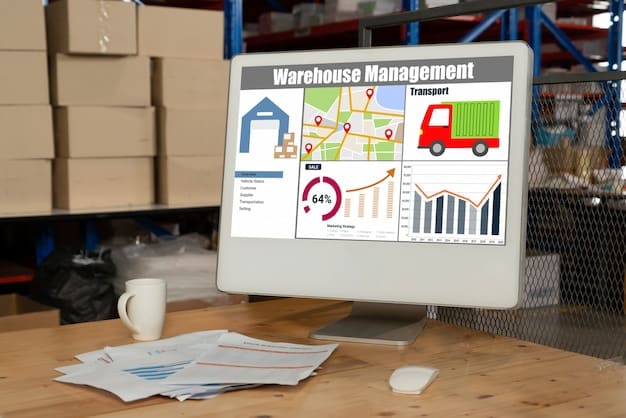The Latest AI Solutions for US Retail in 2025

The Latest AI Solutions for US Retail: Boosting Sales and Customer Loyalty in 2025 are transforming how retailers operate, enhancing customer experiences and driving sales growth through personalized interactions, optimized operations, and data-driven decision-making.
The US retail landscape is undergoing a significant shift, driven by the latest advancements in AI solutions for US retail: boosting sales and customer loyalty in 2025. These technologies are not just futuristic concepts; they are real-world tools empowering retailers to optimize operations and build lasting customer relationships.
AI-Powered Personalization: Tailoring the Customer Experience
In the competitive US retail market, personalization is no longer a luxury but a necessity. AI empowers retailers to understand individual customer preferences and behaviors, enabling them to deliver uniquely tailored experiences.
Understanding Customer Behavior with AI
AI algorithms can analyze vast amounts of data, including purchase history, browsing behavior, and demographic information, to create detailed customer profiles. This allows retailers to anticipate customer needs and offer relevant product recommendations.
Personalized Recommendations and Offers
Based on customer profiles, AI can generate personalized product recommendations and offers, increasing the likelihood of a purchase. These recommendations can be delivered through various channels, including email, mobile apps, and in-store displays.
- Personalized email marketing campaigns show a 6x higher transaction rate.
- Personalized product recommendations increase conversion rates by up to 50%.
- AI-powered chatbots provide instant and personalized customer support.

By leveraging AI, retailers can create a more engaging and satisfying shopping experience, fostering customer loyalty and driving sales growth.
Optimizing Inventory Management with AI
Efficient inventory management is crucial for retail success. AI-powered solutions can help retailers optimize their inventory levels, reduce waste, and improve profitability.
Predictive Analytics for Demand Forecasting
AI algorithms can analyze historical sales data, market trends, and external factors like weather patterns to predict future demand with greater accuracy. This allows retailers to optimize their inventory levels and avoid stockouts or overstocking.
Automated Inventory Replenishment
AI can automate the inventory replenishment process, ensuring that products are always available when customers need them. This reduces the risk of lost sales and improves customer satisfaction.
- AI-powered inventory management systems can reduce inventory holding costs by 20-30%.
- Predictive analytics can improve demand forecasting accuracy by up to 50%.
- Automated replenishment systems minimize stockouts and lost sales opportunities.
AI-driven inventory management not only reduces costs but also enhances the overall customer experience by ensuring product availability and minimizing delays.
Enhancing Customer Service with AI Chatbots
AI-powered chatbots are revolutionizing customer service in the retail industry. These virtual assistants can provide instant and personalized support to customers, improving satisfaction and reducing wait times.
24/7 Availability and Instant Responses
AI chatbots are available 24/7, providing customers with instant support whenever they need it. This eliminates the need for customers to wait on hold or search through lengthy FAQs.
Personalized Assistance and Recommendations
Chatbots can access customer data and provide personalized assistance and product recommendations. They can also answer questions about products, track orders, and resolve issues.
- AI chatbots can handle up to 80% of routine customer inquiries.
- Chatbots improve customer satisfaction by providing instant and personalized support.
- AI-powered virtual assistants reduce customer service costs by up to 30%.
By implementing AI chatbots, retailers can provide exceptional customer service, building stronger relationships and driving repeat business.
AI-Driven Supply Chain Optimization
The supply chain is a critical component of the retail industry, and AI can play a significant role in optimizing its efficiency and resilience. AI-powered solutions can help retailers streamline operations, reduce costs, and improve delivery times.
Predictive Maintenance and Logistics
AI algorithms can analyze data from sensors and other sources to predict potential equipment failures and optimize logistics routes. This reduces downtime, minimizes delays, and improves overall supply chain efficiency.
Real-Time Tracking and Monitoring
AI enables real-time tracking and monitoring of goods throughout the supply chain, providing retailers with greater visibility and control. This helps to identify and resolve potential disruptions quickly.

- AI-driven supply chain optimization can reduce logistics costs by 10-15%.
- Predictive maintenance can minimize equipment downtime by 20-30%.
- Real-time tracking improves supply chain visibility and reduces delays.
By leveraging AI to optimize their supply chains, retailers can reduce costs, improve efficiency, and provide customers with faster and more reliable delivery times.
Fraud Detection and Security with AI
Security and fraud prevention are paramount in the retail industry. AI provides advanced capabilities for detecting fraudulent activities and protecting customer data.
Identifying Suspicious Transactions
AI algorithms can analyze transaction data to identify suspicious patterns and flag potentially fraudulent transactions. This helps retailers prevent fraud losses and protect their customers.
Enhanced Data Security and Privacy
AI can enhance data security and privacy by identifying and mitigating potential security threats. This helps retailers comply with data protection regulations and maintain customer trust.
- AI-powered fraud detection systems can reduce fraud losses by up to 50%.
- AI enhances data security and protects customer privacy.
- Advanced algorithms adapt to evolving fraud patterns, maintaining robust security.
By implementing AI-powered security solutions, retailers can safeguard their businesses and protect their customers from fraud and data breaches.
Transforming In-Store Experiences with AI
AI is not limited to online retail; it’s also transforming the in-store shopping experience. Retailers are using AI to create more engaging and personalized experiences for customers in their physical stores.
Smart Shelves and Interactive Displays
AI-powered smart shelves can track inventory levels, display product information, and provide personalized recommendations to shoppers. Interactive displays can engage customers and provide them with a more immersive shopping experience.
Personalized In-Store Navigation
AI can provide personalized in-store navigation, guiding customers to the products they are looking for and offering relevant recommendations along the way. This enhances the shopping experience and increases the likelihood of a purchase.
- Smart shelves improve inventory management and reduce stockouts.
- Interactive displays engage customers and provide them with personalized recommendations.
- AI-powered navigation enhances the shopping experience and increases sales.
By leveraging AI to transform their in-store experiences, retailers can attract more customers, increase sales, and build stronger brand loyalty.
| Key Point | Brief Description |
|---|---|
| 🤖 Personalization | AI tailors customer experiences, boosting sales. |
| 📦 Inventory Optimization | AI predicts demand, minimizing stockouts. |
| 💬 Chatbots | 24/7 instant customer support. |
| 🛡️ Fraud Detection | AI safeguards transactions and customer data. |
Frequently Asked Questions
▼
AI analyzes customer data to offer personalized recommendations, improving their shopping experience and increasing the likelihood of a purchase.
▼
AI chatbots provide instant support, answer queries, and offer personalized assistance, enhancing customer satisfaction and reducing service costs.
▼
AI algorithms predict demand, enabling retailers to optimize inventory levels, reduce stockouts, and minimize holding costs for improved profitability.
▼
AI optimizes logistics routes, predicts equipment failures, and tracks goods in real-time, streamlining operations and improving overall supply chain efficiency.
▼
AI identifies suspicious transactions and mitigates security threats, safeguarding businesses and protecting their customers from fraud and data breaches.
Conclusion
As we look towards 2025, the integration of AI solutions for US retail: boosting sales and customer loyalty in 2025 will continue to reshape the industry. Retailers who embrace these technologies will be well-positioned to thrive in an increasingly competitive and customer-centric market, enhancing experiences, streamlining operations, and driving sustainable growth.





